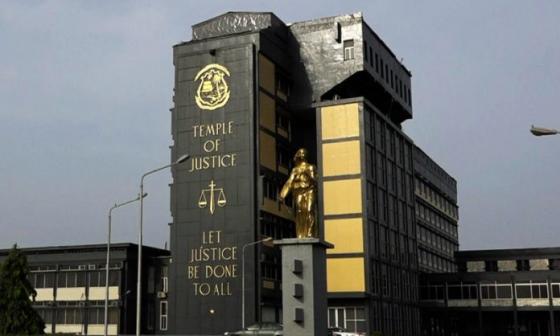Liberia: Supreme Court Rejects House of Representatives' Blocking of Chinese Mining Company Deal

Supreme Court of Liberia.
In a legal blow for members of the House of Representatives, the Supreme Court has ruled that Senate did not violate any provision of the 1986 Constitution while ratifying the 25-year BAO CHICO Iron Ore Concession Agreement for Gbarpolu County, as claimed by the House.
In a unanimous decision, the Court ruled that the agreement is not a revenue generation one, as claimed by the House of Representatives. Instead, it is a concession agreement that would have emanated from any of the two Houses, Senate or Representatives. Both houses have earlier passed separate versions of the BAO CHICO agreement.
Therefore, the court further ruled that there was no constitutional violation by the House of Senate, as being argued by the House of Representatives.
On November 7, 2021, the Senate passed the bill, "An Act to Ratify the Mineral Development Agreement between the Government of Liberia and the BAO CHICO Resources of Liberia”, and was seeking the concurrence of the House of Representatives.
Surprisingly, while the senators were eagerly awaiting their colleagues in the lower house to concur with them (senators), members of the House of Representatives went ahead to ratify the agreement, ignoring similar agreements sent to them by the upper house.
Justifying their decision, the House of Representatives argued that discussion of the proposed agreement should have started with them and not the Liberian Senate, because, according to the members of the lower house, any bill regarding revenue generation should have originated from the House of Representatives.
They further argued that because the agreement was a revenue generation one, and the senators were in breach of the Constitution of Liberia, particularly Article 34, d (i), which among other things says, “All revenue bills, whether subsidies, charges, imports, duties or taxes and other financial bills shall originate in the House of Representatives, but the Senate may propose or concur with amendments as on other bills.”
In counterargument, the Senate said, the House of Representatives was in constitutional error to have ratified the Bio Chico agreement, without passing through the Senate.
They argued that, had the bill been a revenue bill and ratified or passed by the lower house without the knowledge of the Senate, that would not have been a problem, but in this case, it is a concession agreement that needs to be ratified by the upper house and not the other way around.
The controversial Mineral Development Agreement between the Government of Liberia and BAO CHICO Resources Liberia Limited is for the extraction of iron ore, to be operated under a Class “A” Mining License for an initial term of 25 years, in Gbarpolu County, from the time it would have been ratified.
The case grew when members of the House of Senate filed a petition before the Supreme Court, where they sought the court to decide the Constitutionality of ratification of the Bao-Chico Mineral Development Agreement by the Liberian Senate, prior to ratification by the House of Representatives.
President George Weah while submitting the BAO CHICO agreement, said the deal brings huge direct benefits in the forms of employment and revenue, including the payment of all taxes and duties; payments of royalties, and a signature fee of US$3 million.
However, the President did not state the total number of jobs the concession is expected to create.
The company’s investment is in the tune of US$500 million, aimed at improving the country’s economy, creating job opportunities and scholarships for citizens as part of its support to the Government’s Pro-Poor Agenda for Prosperity and Development (PAPD).
